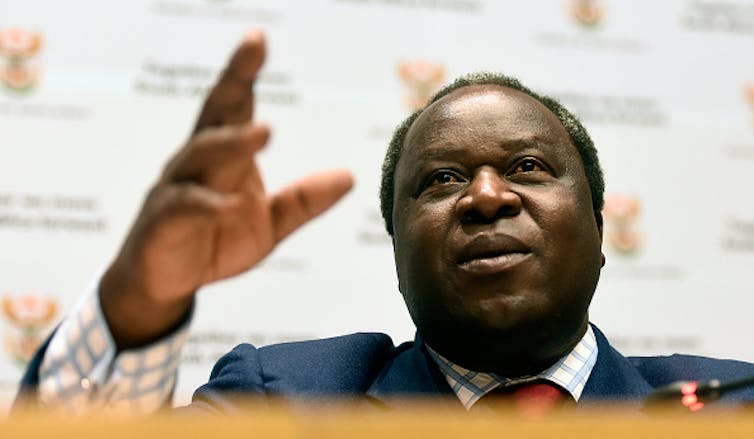The IMF’s $4bn loan for South Africa: the pros, cons and potential pitfalls
By: Danny Bradlow, University of Pretoria

Gallo Images/Brenton Geach
The International Monetary Fund (IMF) has approved a R70 billion (US$4.3 billion) loan for South Africa to help the country manage the immediate consequences of the fallout from COVID-19. The Conversation Africa’s editor, Caroline Southey, asked Danny Bradlow to shed some light on what South Africans should expect.
What conditions has the IMF attached to the disbursement?
The IMF has provided the funding through its Rapid Financing Instrument. This is designed to support countries facing an urgent need for financing due to a crisis such as the COVID-19 pandemic. The goal is to help the country face the immediate financial consequences of the crisis. As a result the IMF provides the financing quickly and without strict conditions. The country merely needs to show the IMF that it is facing a crisis, that it will use the funds to deal with the crisis, that it will cooperate with the IMF to solve the balance of payments problems caused by the crisis and to describe the economic policies that it proposes to follow.
In some cases, the IMF may require the country to undertake certain policy actions before it can access the funds.
In South Africa’s case, the country’s payments problem relates to the fact that the economy is expected to contract by about 7% this year and the budget deficit to increase to about 15% of GDP. This means that the government will need to increase the amount it has to borrow. Given that it has been downgraded by credit rating agencies, and that the economy is in bad shape, there is a substantial risk that both local and foreign investors will have a limited appetite for South African debt. This will complicate the government’s efforts to finance the deficit.
The IMF loan helps resolve this problem.
South Africa provided the requisite information to the IMF in the form of a letter of intent signed by the minister of finance and the governor of the Reserve Bank. The letter has not yet been made public. But, according to the IMF press release, South Africa seems to have informed the IMF that it intends to take certain steps to stabilise the country’s finances. This means that the government will cut government spending to reduce its need to borrow. The current disputes over public sector wages and funding for state owned enterprises are examples of steps it could take. The government has also said it will improve the governance of state owned enterprises, and introduce reforms to stimulate a growing and inclusive economy. These reforms could include measures to improve competition in different sectors of the economy.
Read more:
South Africans should accept that the IMF is neither their worst enemy nor their saviour
South Africa made these undertakings in last October’s medium term budget statement and in the supplementary budget statement in June this year.
This suggests that the IMF is merely expecting the country to implement the policies already announced by the government.
How will the money be disbursed?
This kind of financing is provided in one payment. The IMF press statement doesn’t say when the funds will be disbursed but the goal is to make the funds available “rapidly”. That could be as early as August.
Once the funds are disbursed, the government will be free to spend them. According to the national treasury’s statement, it plans to use the money to support health and frontline services, to protect the vulnerable, drive job creation, support economic reform and stabilise public debt.
These are all consistent with the purpose of the Rapid Financing Instrument and the government’s stated intentions.
But these purposes are very general and we will need to see more detail about what exactly the government will spend the funds on.
What restrictions are there on the government’s ability to use the money?
The IMF loan does not impose any conditions over and above what is in South African law on how the funds can be used. Consequently, the funds will be subject to the same procurement and accounting requirements as all other budgetary expenditure.
In addition, the government will have to account in its future budget statements and reports to parliament on how the funds have been used. South Africans will also be able to demand that the government demonstrate that the funds have been spent consistently with the requirements of the constitution and bill of rights. This means the government should show that it is using the maximum available resources, from whatever source, to help realise all the rights that the constitution and South Africa’s international commitments grant to South Africans.
The IMF requires that South Africa repay the funds to the IMF over 20 months beginning 40 months after the loan is disbursed. This means that South Africans will need to ensure that the funds to repay the IMF are properly budgeted for.
What are the upsides of the loan?
The most important benefit is that South Africa is getting $4.2 billion at about 1.1% interest. This is a very cheap source of funds. If the government tried to raise the same amount either on domestic markets or from other international sources it would pay a considerably higher interest rate – the current rate for government bonds of comparable maturity is about 7%.
The second potential benefit is that the IMF loan will catalyse other funds for the country. In other words investors in South Africa and abroad will interpret the IMF’s action as an expression of support for South Africa and this will give them the confidence to invest in South African debt. Given that foreign investors hold about 30% of South African government’s rand denominated debt this boost to confidence could be important. It will both reduce the incentive of these investors to sell their government bonds, potentially pushing up interest rates, and enable the government to issue new debt if needed.
The third benefit is that by helping to stabilise South Africa’s situation, it will limit the damage that may be inflicted on the neighbouring countries. This, in turn, could help South African exports and thus help preserve jobs and income in South Africa.
What are the downsides?
The most significant downside is that the loan is denominated in foreign exchange. Thus South Africa has to bear the risk that if the rand depreciates, the loan and the interest on it will become more expensive. Given the state of the South African economy, this is not an insignificant risk.
But it’s important to keep in mind that the IMF denominates the loan and the repayment obligations in Special Drawing Rights. These are the IMF’s special form of money and its value is made up of a composite of a basket of currencies. These include the US dollar, the euro, the Japanese yen, the Chinese renminbi and the pound sterling. The values of these currencies tend to fluctuate against each other so that some appreciate while others depreciate. This helps mitigate the foreign exchange risk that South Africa must bear.
The second risk is that if South Africa does not use the funds from the IMF wisely, the country’s economic situation will deteriorate and it will struggle to pay back the debt.
If this happens or the pandemic lasts longer than anticipated, the country could be forced to seek additional support. In either case South Africa’s negotiating position would be significantly weaker.![]()
Danny Bradlow, SARCHI Professor of International Development Law and African Economic Relations, University of Pretoria
This article is republished from The Conversation under a Creative Commons license. Read the original article.
Written by: Natasha
Similar posts
MORE ARTICLES
QUICK LINKS
UpComing Shows

The Best T in the City
With T Bose
He has held it down in the world of mid-morning radio with the best music, riveting topics, brilliant mixes and interesting guests. Every weekday, The Best T proves why he is the BEST by connecting to you like only your bro or favourite uncle could. He lets his listeners dictate the songs they want to hear in the ever-popular Top 10 at 10, and his Three Teaspoons never run out. Catch The Best T in the City Mondays to Fridays from 09h00 to 12h00.
close
Feel Good
With Andy Maqondwana
Feel good about feeling good! That's exactly what The Feel-Good show is about. An escape from the negativity that surrounds us, indulging you in good feels. Pass it on to one and all. Spread the good feeling around Gauteng with Andy Maqondwana.
close
Kaya Biz
With Gugulethu Mfuphi
The world of business is simplified for you by Kaya Biz with Gugulethu Mfuphi. This fast-paced award-winning business show talks to the corporate giants as well as up and coming entrepreneurs about their wins and challenges. Gugulethu invites guests to offer their analyses of markets and economies, and also delves into issues of personal financial wellness. Kaya Biz airs Mondays to Thursdays 18h00 to 19h00.
close
Point of View
With Phemelo Motene
Point of View with Phemelo Motene delves into the day’s current affairs, touches on real issues that affect people’s daily lives and shares expert advice on questions posed by the audience. Mondays to Thursdays 20:00 to 22:00.
close
959 Music Weekdays
Kaya 959 Hits
Real. Familiar. Memorable. Kaya 959 brings you the music you know and love from our playlist. Uninterrupted. Thursdays 20h00 to 21h00
closeConnect with Kaya 959
DownLoad Our Mobile App
© 2025 Kaya 959 | On The Street On The Air















